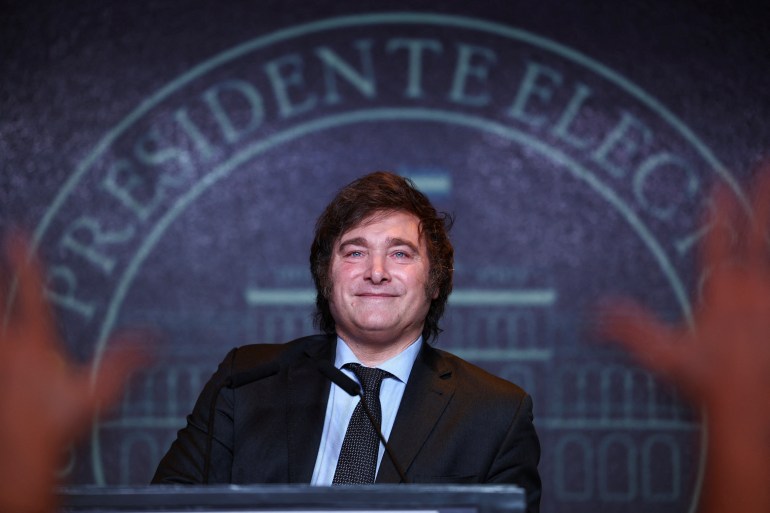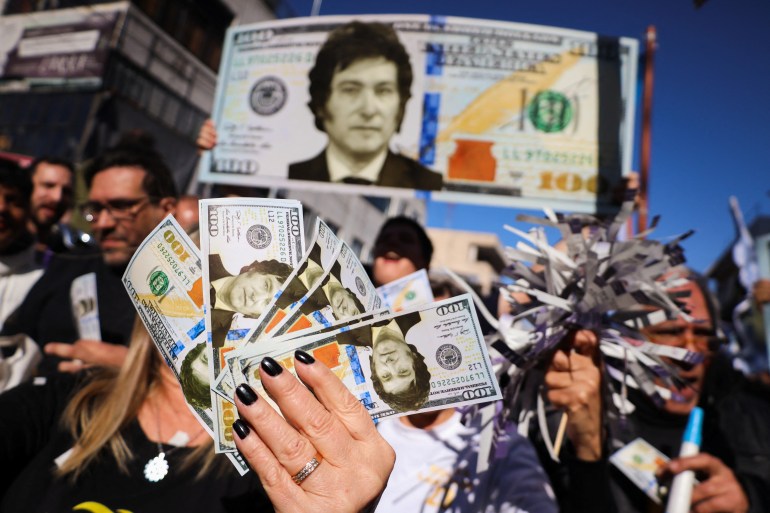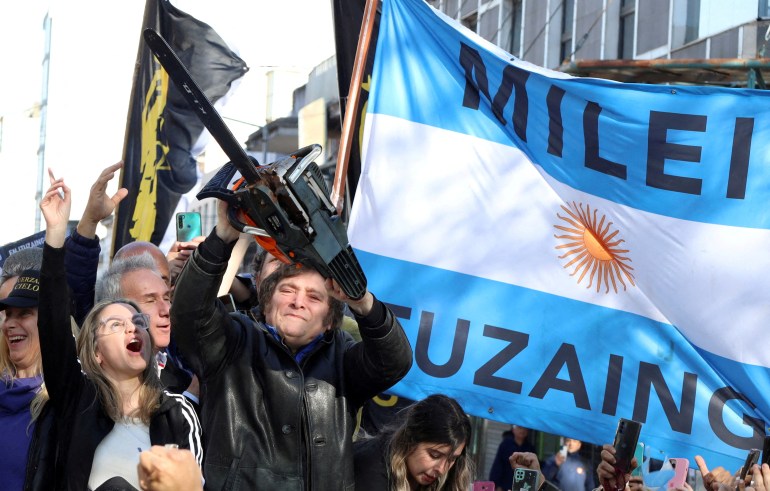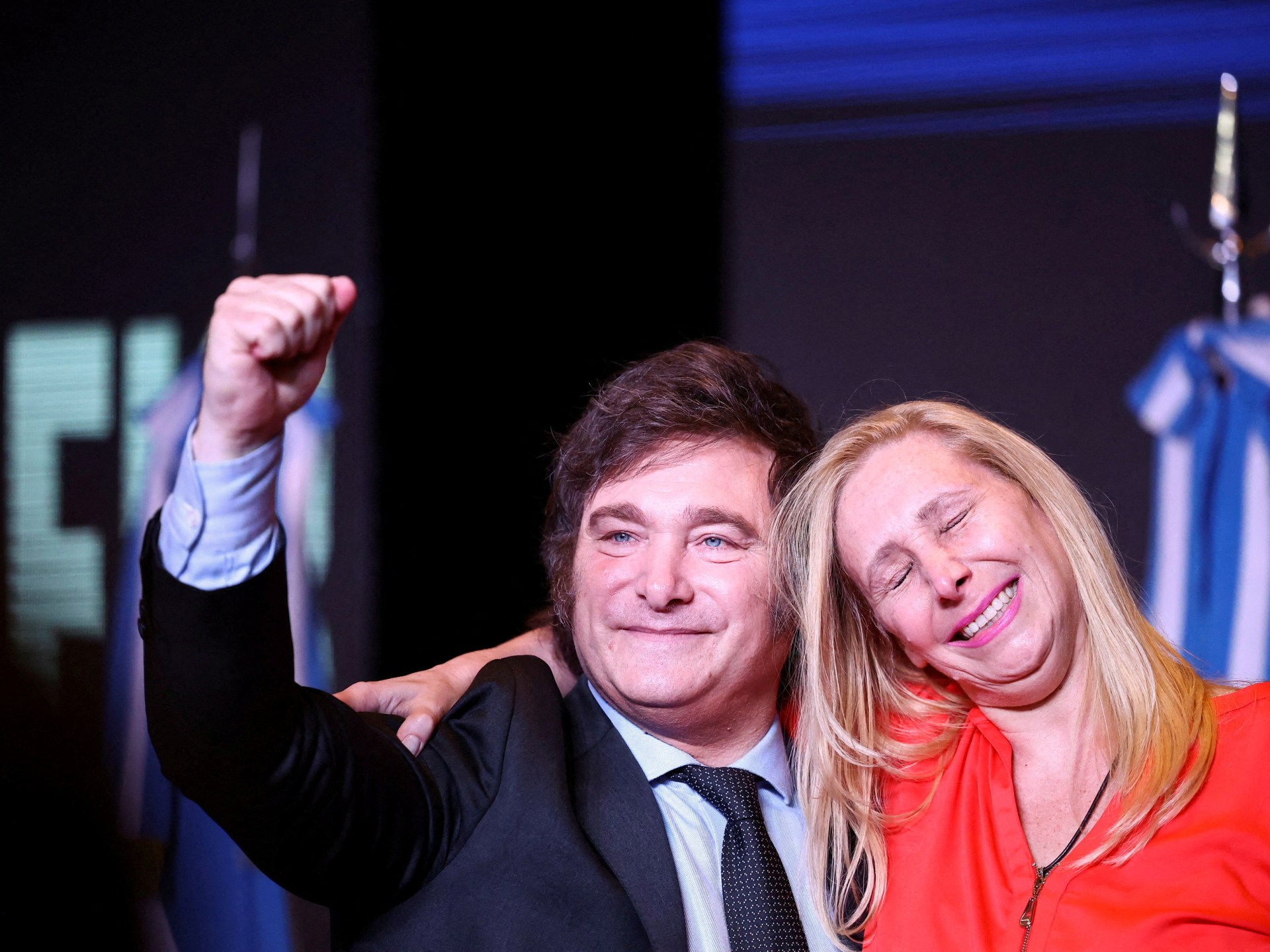Right-wing libertarian Javier Milei is Argentina’s new president-elect.
Milei, a 53-year-old congressman, took nearly 56 percent of the vote versus just over 44 percent for his rival, Economy Minister Sergio Massa. The scale of his victory was unexpected, and Massa conceded before the results were announced.
Here is what we know about Milei’s victory and what might come next:
What happened during Argentina’s election?
Milei won Argentina’s election following an anti-establishment campaign that analysts said was similar to that of former US President Donald Trump.
Speaking after a resounding election victory, he vowed “a limited government, respect for private property and free trade. The model of decadence has come to an end. There is no way back”.
“Today begins the reconstruction of Argentina. Today begins the end of Argentina’s decline. Today ends the impoverishing model of the omnipresent state, which only benefits some while the majority suffers.”
His campaign promise to move Argentina away from the peso to the US dollar as its currency, if enacted, is expected to thrust the country into new territory. No other major economy has a shared currency with the United States or any other nation.

On the streets of Buenos Aires, drivers honked their horns, and outside Milei’s party headquarters, a hotel in downtown Buenos Aires, thousands celebrated his victory.
“This is our chance to think long-term because maybe with this government, there is hope,” Emanuel, a Milei supporter, told Al Jazeera.
But not everyone was in a festive mood.
“I think it’s sad. My chest hurts because this country is for everyone, and these people have no management, no love for their neighbour, and this hurts a lot… We wanted a country for everybody,” Giannina Fernandez, a Massa supporter, told Al Jazeera.

Who is Javier Milei?
His fans call him “the crazy” and “the wig” due to his ferocity and unruly mop of hair, while he refers to himself as “the lion.”
Milei’s eccentricity is central to his brand: He once was the frontman of a Rolling Stones cover band, and he currently owns five cloned dogs, each named after right-wing economists.
He has also raised the possibility of allowing people to sell their own vital organs.
A few years ago, Milei was a television talking head that bookers loved because his screeds against government spending and the ruling political class boosted ratings. Until a few months ago, few gave him a real shot at becoming president of South America’s second-largest economy.
But Milei has rocked Argentina’s political establishment and inserted himself into what has long been effectively a two-party system by amassing a groundswell of support.
Milei consistently led polls of voters between the ages of 16 and 35 ahead of the election.
Mark P Jones, a professor in Latin American studies at Rice University, credits the difference to the deep-seated frustration with Argentina’s crisis and Milei’s image as a political outsider.
“When younger voters look at Milei, they see someone who’s fighting against the system and a rebel,” Jones told Al Jazeera. “And I think one thing Milei has been able to do is effectively dissociate himself with younger voters from his more conservative policies.”
What’s next after Javier Milei’s victory?
Milei said that “there is no room for gradualism, there is no room for lukewarmness or half-measures”.
The new president will take over on December 10.
But he could face obstacles in implementing his policy programme right away.
Dollarise the economy
Milei has proposed the dollarisation of the economy by 2025 to halt the “cancer of inflation”.
Adopting the US dollar as its currency would mean that Argentina would lose control over monetary policy, such as setting interest rates. Argentina also won’t be able to print more money, thereby eliminating the main driver of inflation.
However, dollarisation requires a hefty stock of greenbacks, and the IMF has warned Argentina’s dollar reserves are dangerously low. Even with the backing of the centre-right opposition, political newcomer Milei has “very little legislative power”, analyst Carlos Gervasoni of the Torcuato Di Tella University told French news agency AFP.
“So there is no way to pass laws that, for example, require changing the country’s currency or closing the central bank.”
Massa has criticised the plan for dollarisation as a surrender of national sovereignty.

Stability of the peso
To try and keep a lid on inflation, Argentina has for years strictly controlled the exchange rate of the peso to the dollar, which was frozen for three months before the election and is now being allowed to devalue at 3 percent per month.
The exchange rate is “a total fiction. And to maintain it is extremely expensive. Argentina just has literally no money. It can’t continue doing this,” Nicolas Saldias, a senior analyst with the Economist Intelligence Unit told AFP.
Between now and when Milei takes office, “things could rapidly scale out of control”, said political analyst Ana Iparraguirre of GBAO Strategies. “That’s a period of a lot of instability.”
Saldias said people may panic believing dollarisation is imminent, sparking a run on the peso.
Massa may also implement a long overdue devaluation of the peso, making Milei “pay the political price”.
“You’ll probably see inflation ramp up very quickly,” said Saldias, warning of possible hyperinflation.
State spending
Milei often appeared on stage at rallies with a chainsaw, vowing to slash public spending by 15 percent, privatise state companies and reduce subsidies on fuel, transport and electricity.
Such belt-tightening has long been demanded by the International Monetary Fund (IMF), which has bailed out Argentina 22 times, most recently with a loan of $44bn dollars in 2018.
But Milei will face the same challenges as predecessors who have tried to get out of a vicious cycle of budget deficits, debt, money printing and inflation.
“At this point, everything you fix worsens a second problem,” Benjamin Gedan, director of the Argentina Project at the Washington-based Wilson Center told AFP. “The pain will be acute and spread widely if there is a serious stabilisation program, and it’s not clear that Argentines will see the upside.”
There is also the danger of protests and social unrest, especially given that almost half the country did not want Milei in power.

Could Milei turn Argentina around?
Gedan said that if Milei and his allies in the current opposition do manage to curtail spending and reduce welfare and subsidies while protecting the most vulnerable, “this could be a turning point for the good”.
There are other positives on the horizon.
After Argentina’s worst drought in a century, which saw agricultural exports plummet in the past two years leading to a $20bn shortfall in revenue, the country expects a bumper harvest in 2024.
Milei will also benefit from an estimated $10bn in annual savings in energy imports as a new gas pipeline ramps up production from southern Vaca Muerta – a massive oil and gas reserve – estimates economist Elizabeth Bacigalupo of the Abeceb firm.
Sumber: www.aljazeera.com
 Skip to content
Skip to content

